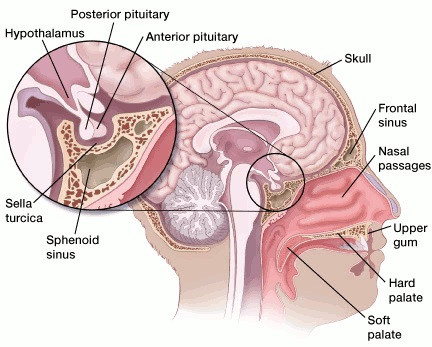Dr Sunita De Sousa: Pioneering Pituitary Research and Driving Progress Through Collaboration
Associate Professor Sunita de Sousa is a leading endocrinologist and clinician scientist dedicated to advancing pituitary tumour research.
%20(1).png)
The driving force behind the SA Pituitary Research Group, she has brought together an expert multidisciplinary team of physicians, surgeons, and scientists to advance cutting-edge research that directly benefits patients in South Australia and beyond.
Endocrinologists are medical specialists who diagnose and treat conditions related to hormones and endocrine glands (glands that release hormones into the blood). The pituitary gland is a small pea-sized endocrine gland located at the base of the brain below the hypothalamus. It is the ‘master gland’ that controls other endocrine glands and therefore regulates critical body functions. Pituitary tumours account for approximately 10-15% of all brain tumours, affecting 1 in 1000 people. Pituitary tumours may cause headaches, loss of vision and hormonal problems such as infertility, abnormal height and serious metabolic disorders. The treatment of pituitary tumours often involves a complex mix of medications, highly specialised surgery and radiotherapy.

For International Women's Day and Brain Injury Awareness Month we sat down with A/Prof De Sousa to discuss her latest work, her experience as a woman in science and her thoughts on this year's theme, #March Forward #AccelerateAction.
What inspired you to pursue a career in medical research?
I am a medical doctor, so my primary job is to see patients and diagnose and treat their health conditions (with medications as I am a physician, not a surgeon). I could do this all day, every day, but my attention is split between this sort of clinical medicine and medical research because, frankly, I love research. I love that research allows me to know and directly develop the evidence base for the clinical decisions we make as doctors so that we can provide medical
care that is as safe and as effective as possible for our patients. My scientific findings directly inform the care of my patients and my patients, and the medical dilemmas we face are the inspiration for my studies. I love the creativity, problem solving, intellectual challenge and communication skills that impactful medical research demands. And I love that research can help patients far beyond just those who I see in my hospital.
Finally, research is a team sport. I get to work with fabulous colleagues across specialties, particularly neurosurgeons and skull base ENT surgeons with whom I work closely in the Royal Adelaide Hospital Multidisciplinary Pituitary Clinic and the SA Pituitary Research Group. We also get to collaborate with colleagues interstate and internationally, meaning that we can generate world-class research into new diagnostic tools and new types of tumour treatments that help our patients here in South Australia.
This year’s International Women’s Day theme is March Forward: Accelerate Action. What action do you think is still needed to better support women in science?
Female representation dwindles at the top. This has been objectively shown in both clinical medicine and academia. We need to take on leadership roles when we can, and be the role models that younger women - and men - need to see. We need to support other women to take on these roles too, and shine a light on them when they do.
Have you faced any challenges as a woman in this field, and how have you overcome them?
There is no denying that navigating maternity leave in an academic career is an immense challenge. Noting 'career interruptions' in a CV or grant application doesn't cut it as it completely glosses over the morning (or continuous) nausea, years of disturbed sleep and 24/7 second job in the form of your kids. These hurdles differ between families and often are shared between parents, but there is no doubt a heavy handicap placed on women in science having babies. What most helped me having two babies in my late PhD/early postdoctoral years was to have strong and understanding supporters who allowed flexibility in when and how I conducted my research. Mentorship is also really important here. It doesn't need to be formal, but we need to tell our stories and show that having babies and pursuing a career in medical research are not mutually exclusive.
A Vision for the Future of Pituitary Research
Associate Professor De Sousa's research has identified a novel link between the CHEK2 gene, known to be involved in tumour suppression in breast cancer, and pituitary tumours.

Her other ongoing research looks at genetic changes that make some pituitary tumours more aggressive, as well as familial pituitary tumour syndromes, where tumours run in families, and innovative technologies to visualise pituitary tumours. Her team is also investigating whether dopamine agonist treatment causes pituitary tumour fibrosis leading to poorer surgical outcomes—a presumed effect that recently changed international treatment guidelines for prolactinomas, "Our feeling is that this drug does not cause tumour fibrosis based on our wide clinical and academic experience with prolactinomas." The diverse expertise of physicians, surgeons, and researchers makes the SA Pituitary Research Group uniquely positioned to investigate this area.
In both her research and clinical practice, collaboration is key, with grand plans to revive and expand the Adelaide Pituitary Database.
“It really is about improving every stage of care—better diagnosis, better treatment, better surveillance, and better health predictions for individuals and their families,” she says.
With her leadership and vision, Dr De Sousa is shaping the future of pituitary research and patient care—one breakthrough at a time.
Your support fuels innovation that saves lives. Learn more about how Dr De Sousa and her colleagues are transforming research into real-world impact here: Current Pituitary Tumour Research




